There's a place in Tusheti, where horses run freely in herds. Soso Shetidze, a Tush horseman created a horse paradise on Earth, pursuing ancestors' style of horsemanship. Then he met Ira Hartmann from Germany, who adds a modern twist to his work- she helps him promote his unique style and collect famous horsemanship methods from Europe.
Ira Hartmann is a lawyer and organizational developer and had been traveling back and forth to Georgia since 2005. In 2005 she worked as a lawyer with GIZ, former German GTZ. Soso and she met through a mutual friend in 2014 and when she saw him working with his horses she was amazed by the quality of his horsemanship, his horses, and the infrastructure he can use and rely on to keep his horses.
‘’At this point, I was already looking for an option in Georgia where I could bring in my knowledge. My philosophy is preserving what is excellent and unique, improving, what has to be improved, and by that creating something very unique. Born and raised in the former GDR the time after the wall came down is still a very negative memory to me. Many good working things were destroyed or abolished just because they were not “en vogue” anymore or people in charge did not want to bother to deal with the things that worked well because it was easier to just copy and paste what had been working in western Germany nor did they bother to involve the people in creating something new together. Sometimes it was lack of time but mostly chances not taken. I have never wanted that for Georgia, for Georgian traditions and people, and always wanted to just do it better. Soso knew that I had been into horses and an equestrian all my life already and one day joked about why not buy a horse from him and start working with him. And that is how it all started,’’-says Ira Hartmann.
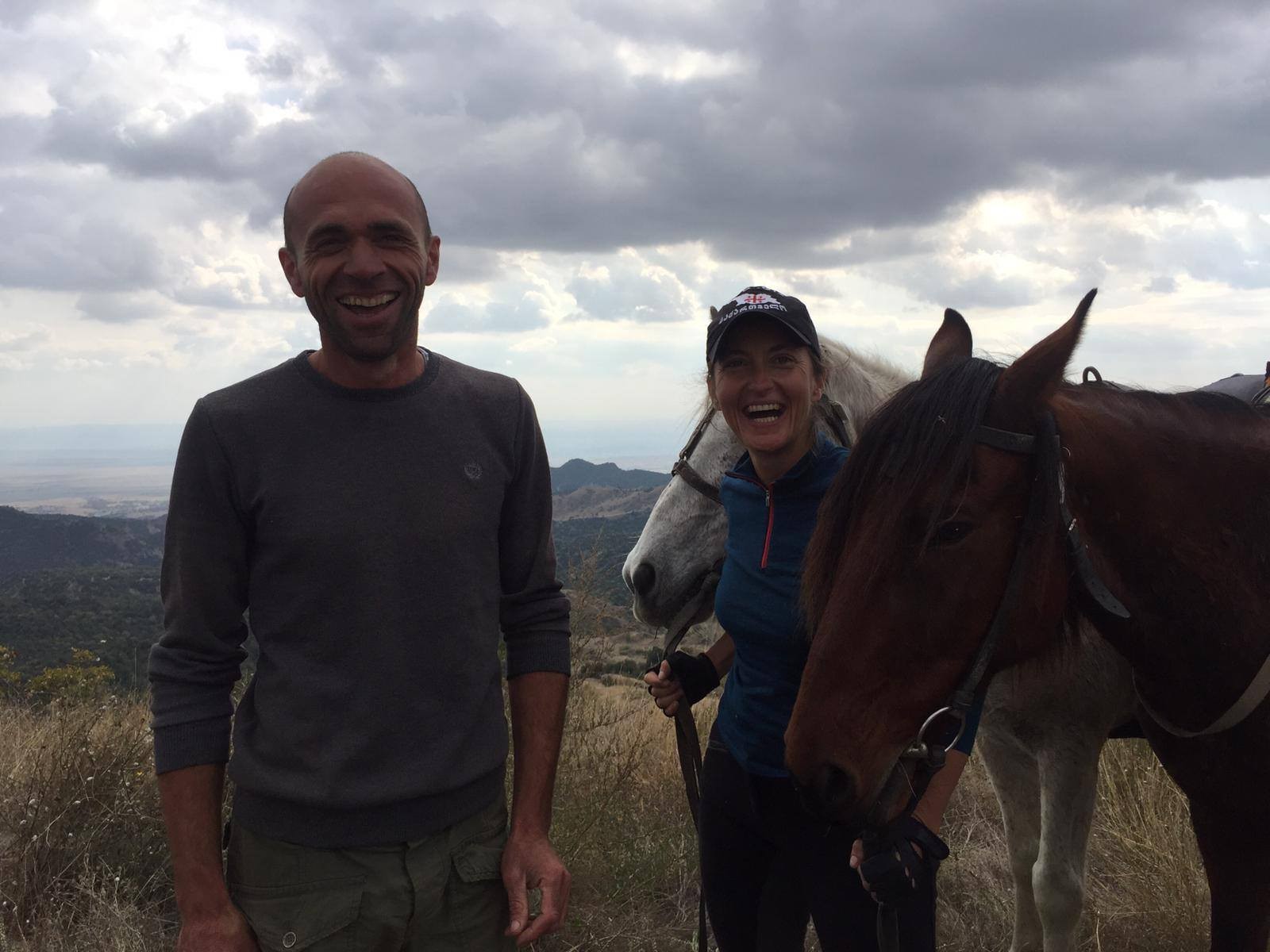
By now she owns three horses that live with Soso in this horse paradise of his and supports his farm company as a sparring partner. According to her, Georgian farmers, not only Soso, have so much knowledge and sometimes even can’t imagine how valuable it is because it is normal for them, nothing special.
‘’But for us, coming from western Europe where we now start all these old traditional methods again after years of industrializing it, it is. Soso owns about 60 horses that live freely in a herd structure on hundreds of hectares of land, which is to Western European standards a great achievement. Half wild, free, outside 24 hours, mixed herd and because of all this health in body and mind, Soso has all that is only now coming slowly “en vogue” again in Germany and many other Western European countries,’’-explains Ira.
We asked her what makes their methods unique in equine business and how she helps him show it to the world:
‘’Not many in equine business can keep the horses the way Soso does – with that amount of space to roam around freely and at the same time, he lives so closely with his horses, being around them 24h. Soso is a true horseman from childhood on, he just has this horse whispering thing you cannot learn in seminars nor can you learn later on. You have it because you grew up with horses naturally.
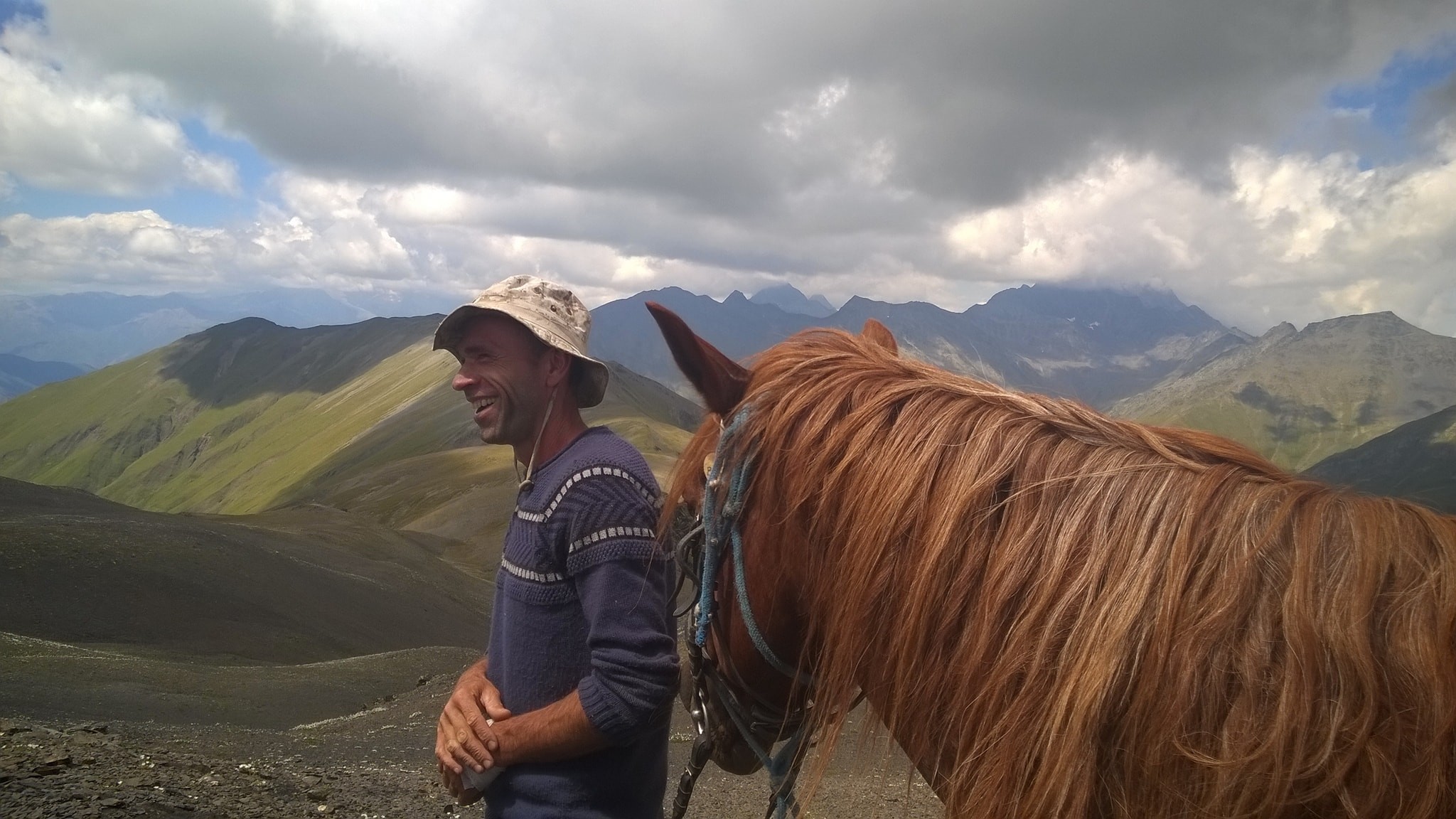
Sometimes in Tusheti he takes his binoculars in the morning and tries to spot his horse herd. Horses sometimes preferred a certain meadow about 5 km away and then off they go. And Soso is looking for them in the morning. A situation where all German horse owners would start panicking already due to insurance problems and the danger of accidents. But not here in Georgia. Swimming on a hot day – horses decide themselves. No fences and no civilization is stopping them. Cooler mountainair today? Ok, let's go. Further south for grazing today? Ok, let's walk over there. Horses need, according to their genes, the ability to move 30 km and 16 hours per day while grazing, playing, etc.
With this in mind, Soso 100% preserves this horse paradise and the space the horses have. Unique is also the semi-nomadic lifestyle Soso and his horses live, the way his Tush ancestors have lived before. The amazing transhumances in spring and fall, when all cattle are on the way up to Tusheti from the lowlands or back down in fall, are part of a very unique lifestyle that is for some regions UNESCO heritage already. Think of the movie Tushi metskhvare, which is a gem in Georgian moviemaking and luckily preserves this traditional lifestyle already in a movie. While keeping these traditions and excellence Soso allows guests to experience all this and be part of a real Tush horseman life. I support him with the overall business development and by spreading the word and running his social media accounts.’’
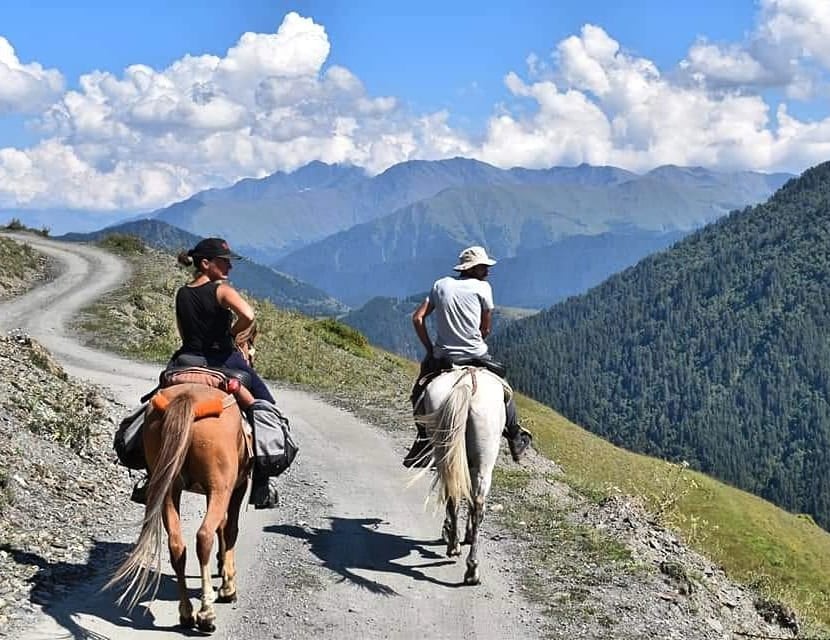
Soso does horse-riding tours which is a unique experience, Ira Hartmann gave us more insight:
From October till May Soso and the horses live at the entrance of Vashlovani Nationalpark, where he offers a farm stay. The park entrance is just 2km away and the surroundings are steppe-like and the perfect place to free your mind. Day Tours, tours, in the Nationalpark, around or even to Dedoplistskaro (Elia monastery) or David Gareji – it’s the perfect starting point and the horses start from their beloved homelands. The local shepherds are all part of this as they and their sheep or cows are a big plus. Guests love visiting them and therefore sometimes the first time get to know the real-life of them. Vashlovani is suited for fast gallops but all tours serve all riding abilities.
Beginning of June Sosos horses go on their six-day horse drive up to Tusheti. Usually, guest riders need to travel to the US to experience such an event but it is possible in Georgia as well. This is a very unique but rough tour. You camp next to the herd and sit about 6-7 hours in the saddle each day. The summer the horses spend in Tusheti. The summer in Tusheti is always very special. Daytours or circles in Tusheti are possible. Soso also offers a small or big Transcaucasus experience. From Omalo to Shatili or even further on via Roshka to Juta/Kazbegi (5/9 days in the saddle). In the beginning of October Soso drives the herd down back from Tusheti to Vashlovani, which is a very pleasant experience with the ongoing grape-harvesting and also shepherds moving their cattle on Tusheti road.
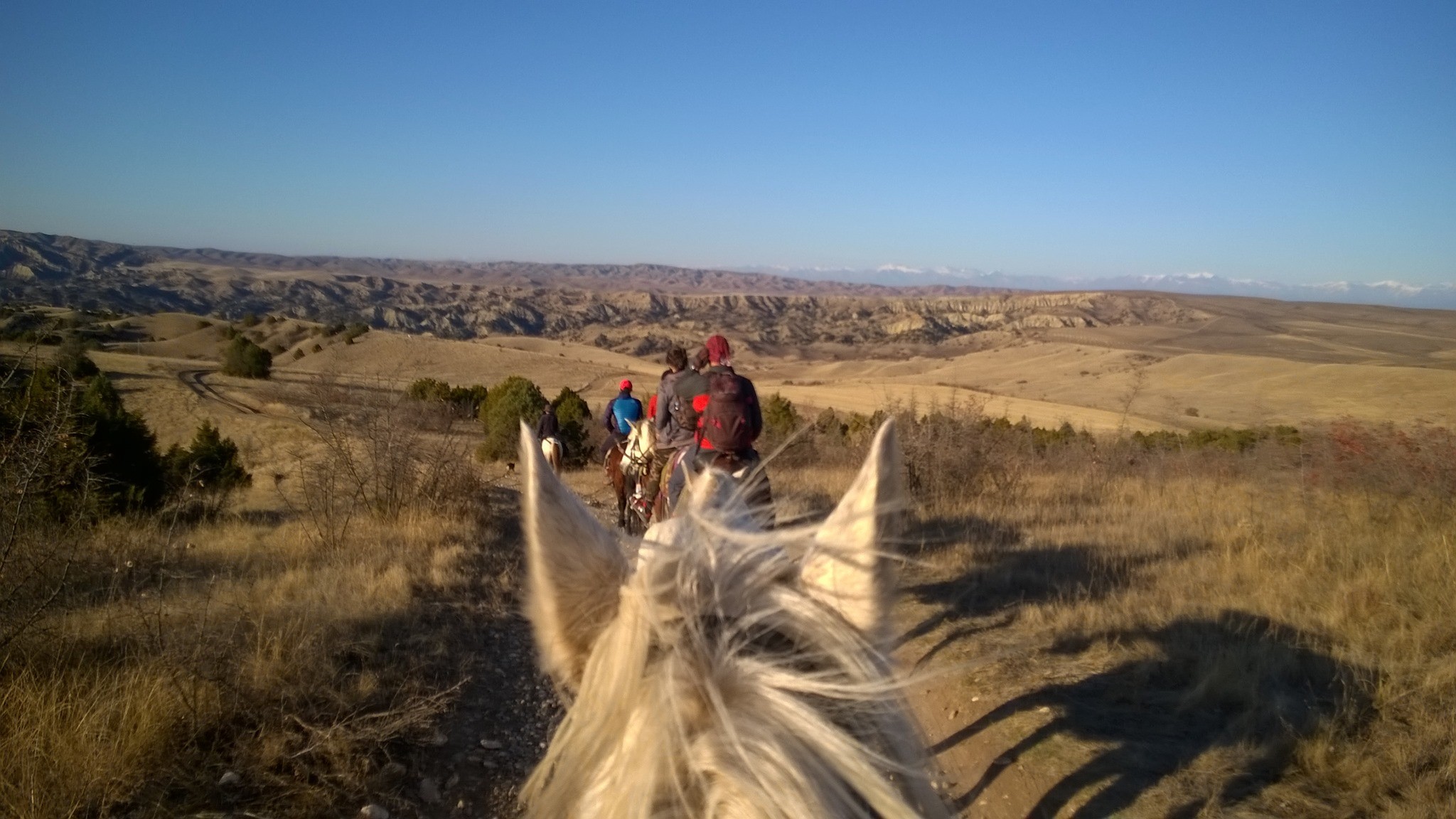
CBW: Apart from the fact that his guesthouse Farmstay in Vashlovani is located in the middle of nowhere, what distinguishes this place from others?
The farm stay that strives to work as sustainably as possible (solar power only, using rainwater, etc.) is embedded in the lifestyle of a true Tush: semi-nomadic, winters in Vashlovani, and summers in Tusheti, where Soso's family house is in Kumelaurta. The farm in Vashlovani called Tushi Mejoge follows the tradition of Tushi Metskhvare movie but renewing the bond and the perspectives locals used to have by serving as a meeting point, continuing working together, collecting new ideas from abroad, and including them in everyday life. Soso is promoting ©Georgian natural horsemanship as the way of working with horses.
CBW:What are the advantages of horse keeping in Georgia?
The freedom and space. Imagine: In Germany it is not possible to have sheep, horses, cows on a road like here, cars taking over, the normal flow of life continuing, and have them stop for grazing at certain places. I do hope that Georgia saves this freedom for its people and cattle. Horsekeeping is still natural and horses can live like real and healthy horses do. It has not been industrialized yet and hopefully, there will never be a horse industry but instead, based on the good experience of the locals, not only Tush people but also Svans and other folks, there will be a special and unique way of dealing with animals and especially horses. Besides: the business environment in Georgia is something we regard as highly positive as it encourages people to try different things without too many rules that could take your breath away before you even get started. I love that Georgians can very easily start a business and are not kept away from it by too much administration.
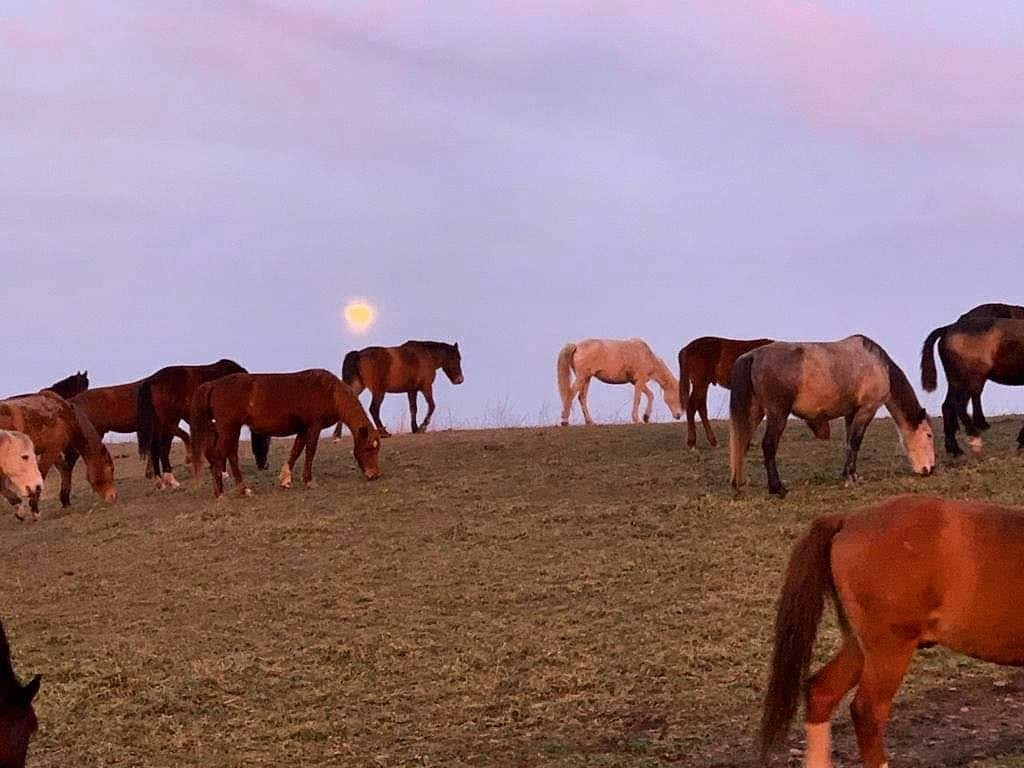
CBW: How do you manage to keep local traditions while developing a modern twist?
We preserve traditions together with the local community. First, you need to be the platform where locals meet and keep their traditions alive, and second include them and the guests visiting but also new elements and methods of farming, horsekeeping, or tourism of course. In both areas but also on the way between Tusheti and Vashlovani Soso has a great network of local shepherds, farmers, and guesthouse owners. This network is it, what makes it so perfect and alive. We follow the tradition of Tushi Metskhvare and Soso worked in Germany and Poland on several horse farms and in different styles of horsekeeping (from classical sportstable to ecostable with horsemanship focus) and participated in several pieces of training in different styles and horsemanship – he knows now how to focus on his Georgian horsemanship, adds some modern knowledge that convinced him and preserves what is holy and crucial to his horses and him by keeping quality and safety.
What does the future hold, once the world opens?
Healthy and happy horses first! Great guests on beautiful tours, giving something back to Eldari village and the local community, new features in the farmhouse, and a few more surprises, that are still in the making.